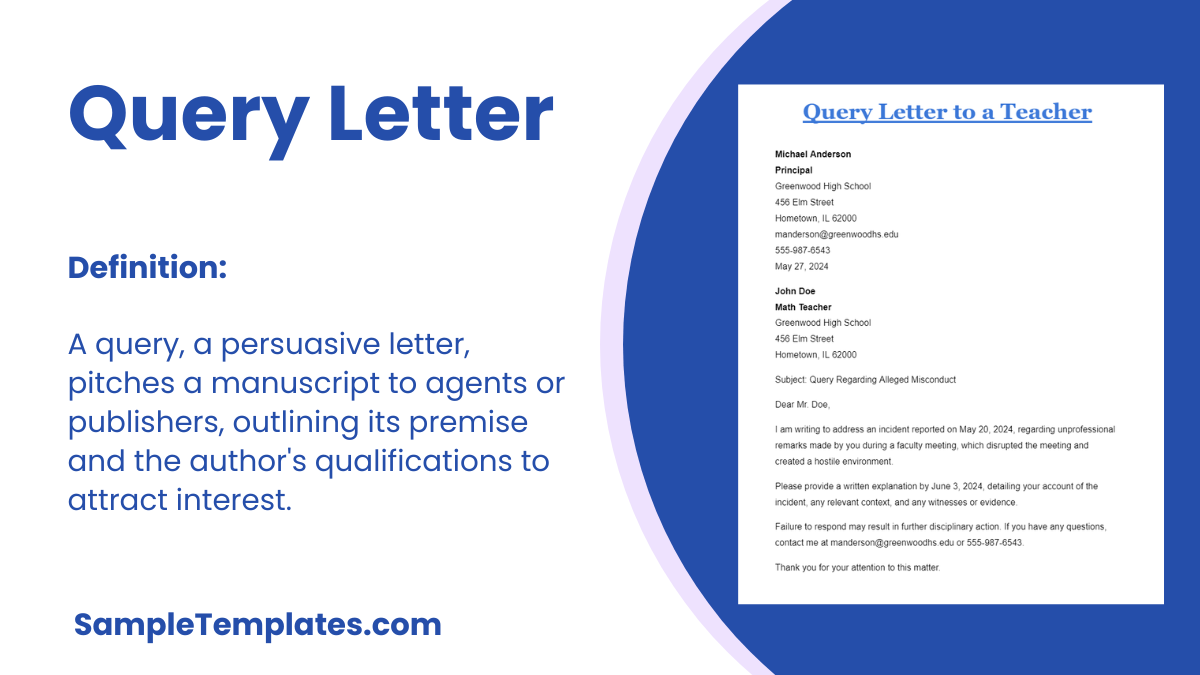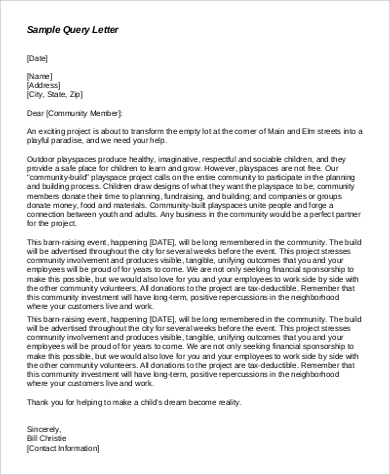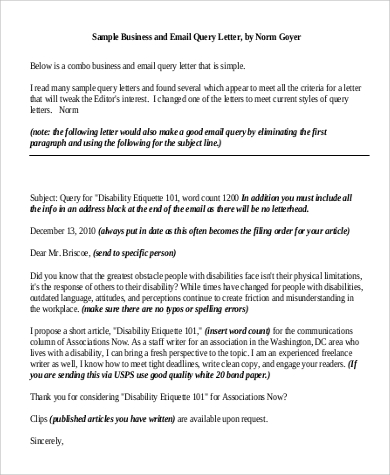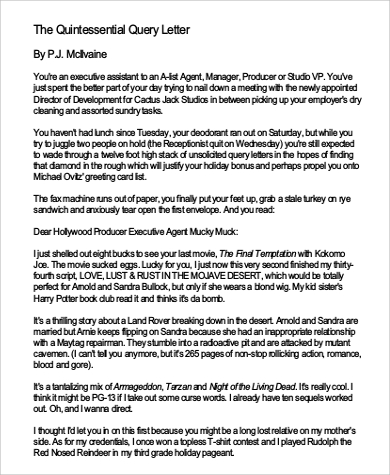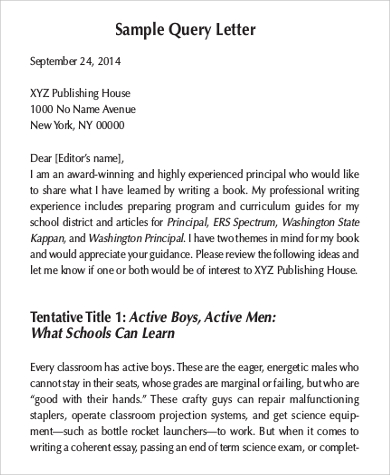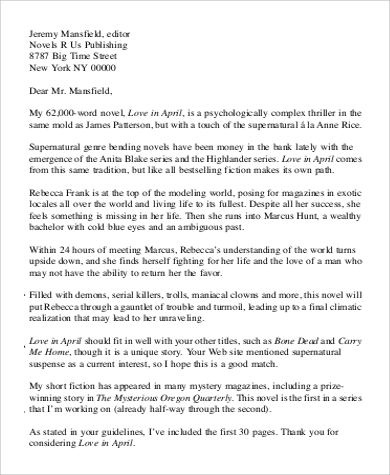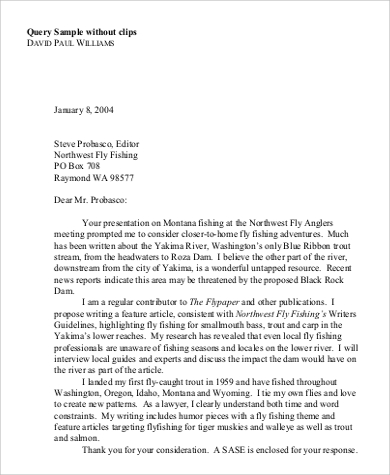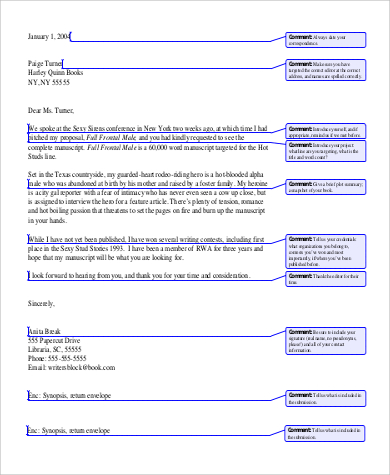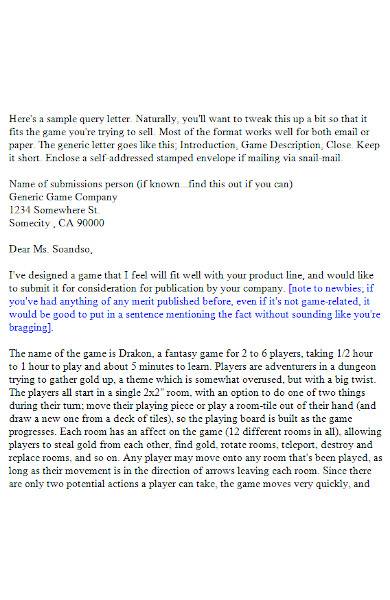As an author, there is one more important piece you have to write apart from your literary work schedule, and that is your query letter. The query letter is addressed to publishing companies or agents on the subject on representation.
Essentially, you are looking for a publisher that would carry and reproduce your literary piece. It is thus very much like a sales pitch. Of the piles of manuscripts that publishing houses have to go through, not one of their people want to read through 500+ pages of your work only to find out that it is not the type of novel that their company represents. Hence, your first ticket to becoming a published author is a concise and convincing query letter, like these tried and tested Sample Letters. It is thus a very crucial document that could determine your success in the industry.
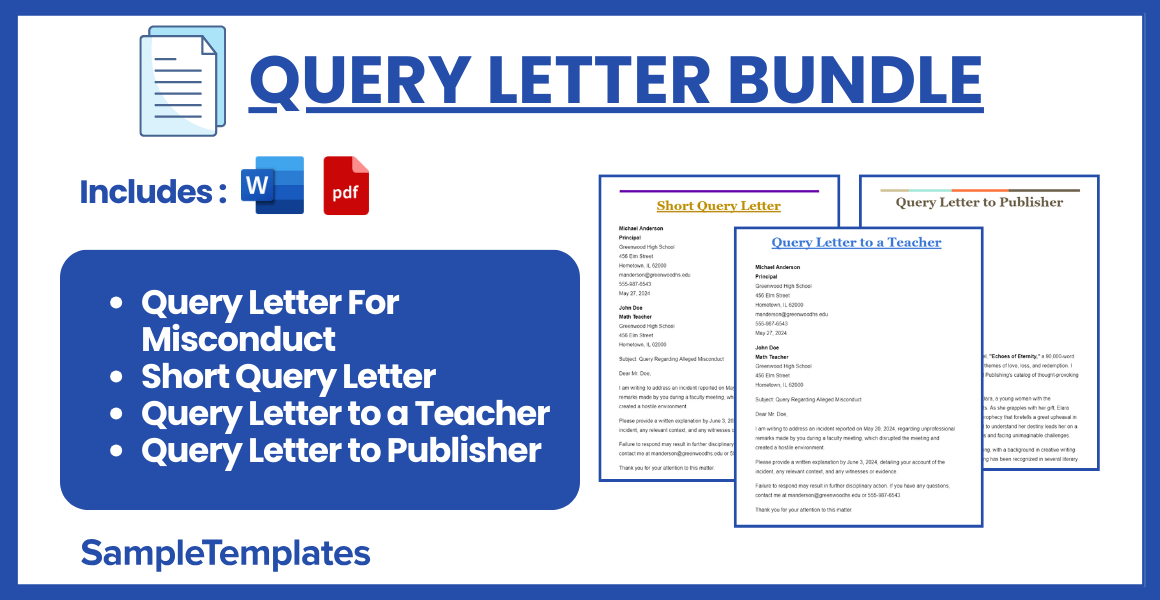
Query Letter For Misconduct
Michael Anderson
Principal
Greenwood High School
456 Elm Street
Hometown, IL 62000
manderson@greenwoodhs.edu
555-987-6543
May 27, 2024
John Doe
Math Teacher
Greenwood High School
456 Elm Street
Hometown, IL 62000
Subject: Query Regarding Alleged Misconduct
Dear Mr. Doe,
I hope this letter finds you well. I am writing to formally address a matter of concern regarding your recent behavior that has been reported to the administration. It has come to our attention that on May 20, 2024, you were allegedly involved in inappropriate conduct during a faculty meeting.
Specifically, it has been reported that you made unprofessional remarks towards a colleague, which disrupted the meeting and created a hostile environment. Such behavior, if verified, constitutes a breach of our school’s policies, particularly our code of conduct which emphasizes respect and professionalism.
We take these allegations very seriously, as they impact the integrity and safety of our educational environment. We request that you provide a written explanation regarding this incident. Your response should address the following points:
- A detailed account of your actions on the specified date.
- Any relevant context or factors that may have influenced your behavior.
- Any witnesses or evidence you wish to present in your defense.
Please submit your written response by June 3, 2024. Failure to respond within the stipulated time frame may result in further disciplinary action, including but not limited to suspension or further investigation.
We are committed to ensuring a fair and thorough review of this matter. If you have any questions or require further clarification, please do not hesitate to contact me directly at manderson@greenwoodhs.edu or 555-987-6543.
Thank you for your immediate attention to this serious matter.
Sincerely,
Michael Anderson
Principal
Greenwood High School
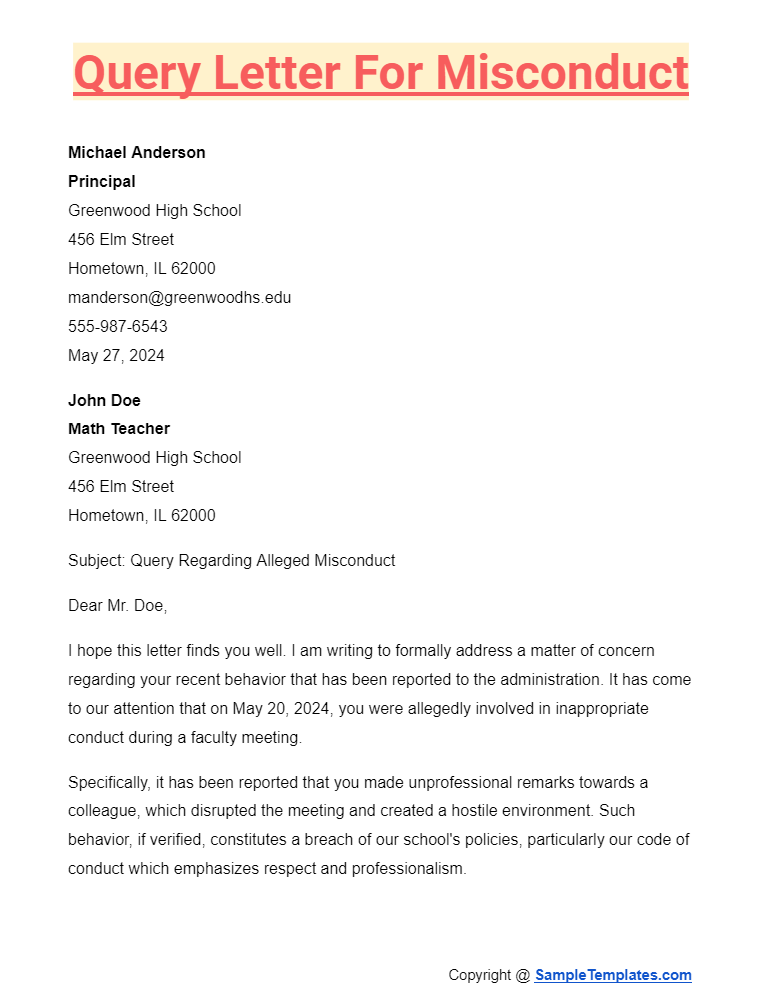
Short Query Letter
Michael Anderson
Principal
Greenwood High School
456 Elm Street
Hometown, IL 62000
manderson@greenwoodhs.edu
555-987-6543
May 27, 2024
John Doe
Math Teacher
Greenwood High School
456 Elm Street
Hometown, IL 62000
Subject: Query Regarding Alleged Misconduct
Dear Mr. Doe,
I am writing to address an incident reported on May 20, 2024, regarding unprofessional remarks made by you during a faculty meeting, which disrupted the meeting and created a hostile environment.
Please provide a written explanation by June 3, 2024, detailing your account of the incident, any relevant context, and any witnesses or evidence.
Failure to respond may result in further disciplinary action. If you have any questions, contact me at manderson@greenwoodhs.edu or 555-987-6543.
Thank you for your attention to this matter.
Sincerely,
Michael Anderson
Principal
Greenwood High School
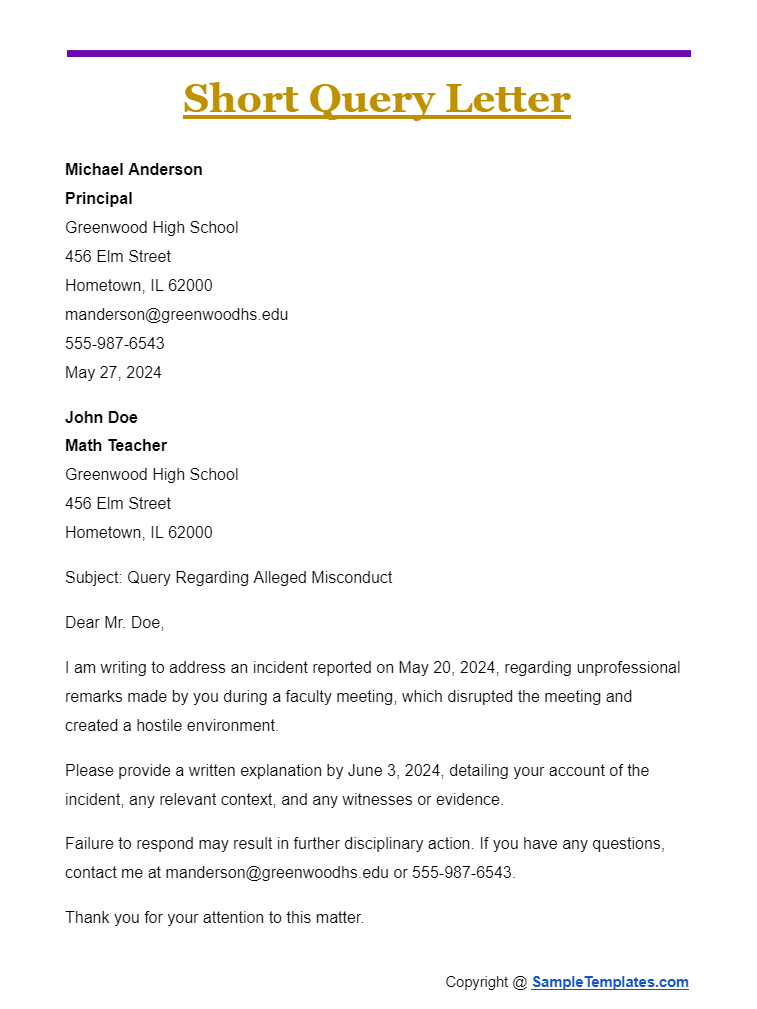
Query Letter to a Teacher
Michael Anderson
Principal
Greenwood High School
456 Elm Street
Hometown, IL 62000
manderson@greenwoodhs.edu
555-987-6543
May 27, 2024
John Doe
Math Teacher
Greenwood High School
456 Elm Street
Hometown, IL 62000
Subject: Query Regarding Alleged Misconduct
Dear Mr. Doe,
I am writing to address an incident reported on May 20, 2024, regarding unprofessional remarks made by you during a faculty meeting, which disrupted the meeting and created a hostile environment.
Please provide a written explanation by June 3, 2024, detailing your account of the incident, any relevant context, and any witnesses or evidence.
Failure to respond may result in further disciplinary action. If you have any questions, contact me at manderson@greenwoodhs.edu or 555-987-6543.
Thank you for your attention to this matter.
Sincerely,
Michael Anderson
Principal
Greenwood High School
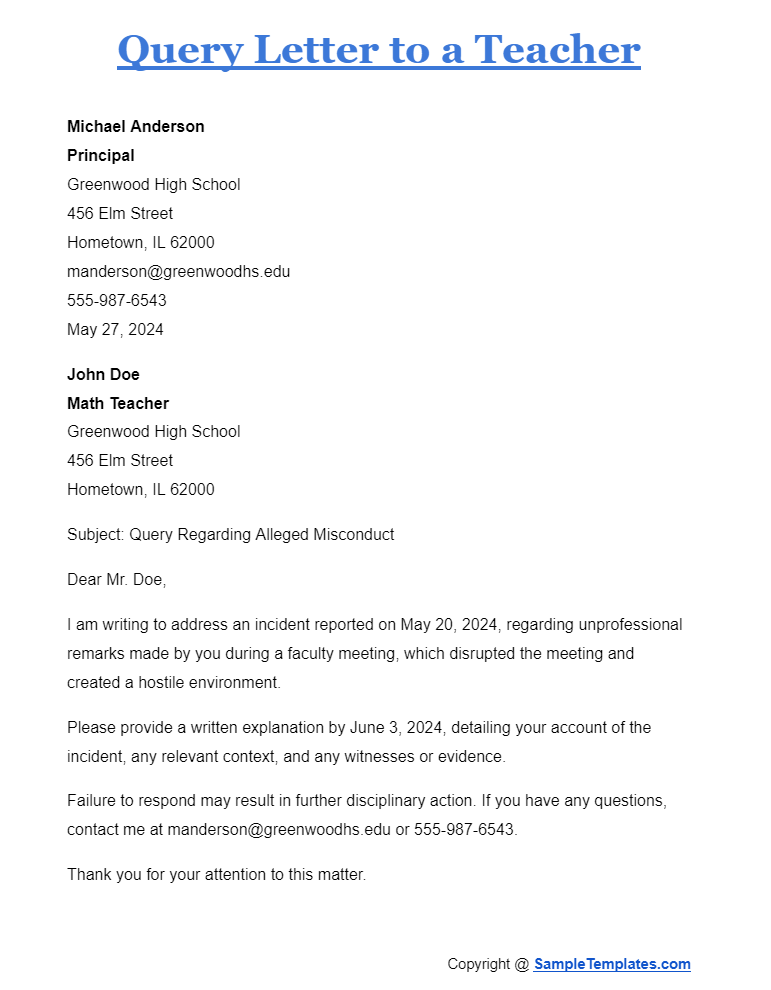
Query Letter to Publisher
Jessica Taylor
789 Maple Street
Boston, MA 02108
jessicataylor@email.com
617-555-7890
May 27, 2024
Mr. Alan Green
Senior Editor
Greenwood Publishing
456 Publisher Lane
New York, NY 10001
Dear Mr. Green,
I am seeking representation for my debut novel, “Echoes of Eternity,” a 90,000-word work of contemporary fantasy that intertwines themes of love, loss, and redemption. I believe it would be a perfect fit for Greenwood Publishing’s catalog of thought-provoking and imaginative fiction.
“Echoes of Eternity” follows the journey of Elara, a young woman with the extraordinary ability to communicate with spirits. As she grapples with her gift, Elara uncovers hidden truths about her past and a prophecy that foretells a great upheaval in the world of the living and the dead. Her quest to understand her destiny leads her on a path of self-discovery, forging unlikely alliances and facing unimaginable challenges.
I have always been passionate about storytelling, with a background in creative writing and a deep love for fantasy literature. My writing has been recognized in several literary competitions, including the Boston Writer’s Award, where I received an honorable mention for my short story, “The Whispering Trees.”
I am enclosing the first three chapters of “Echoes of Eternity” for your review. I would be delighted to send the complete manuscript upon request. Thank you for considering my work. I look forward to the possibility of working with you and bringing Elara’s story to life for readers everywhere.
Thank you for your time and consideration.
Sincerely,
Jessica Taylor
jessicataylor@email.com
617-555-7890
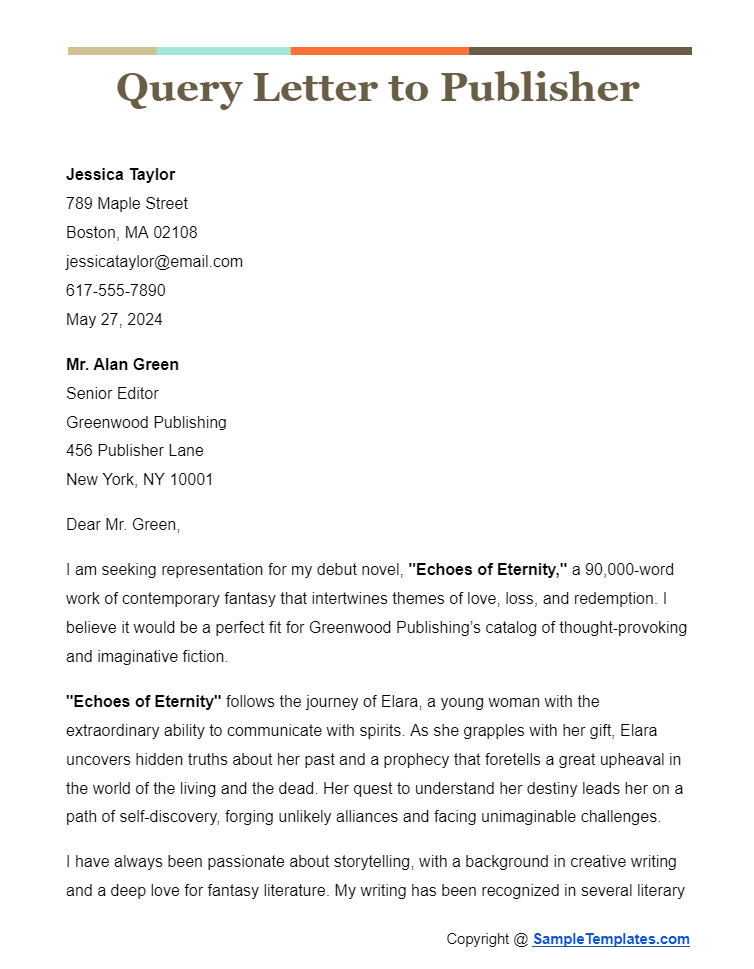
Browse More Templates On Query Letter
Response to Query Letter Sample PDF
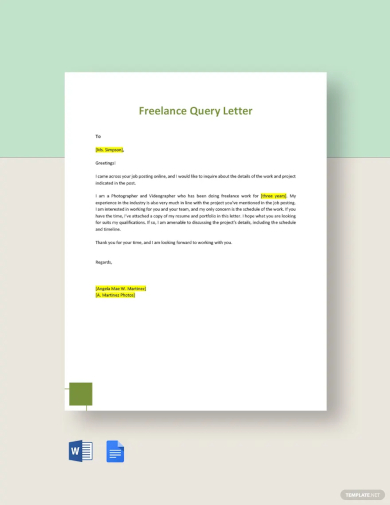
Query Letter Sample PDF
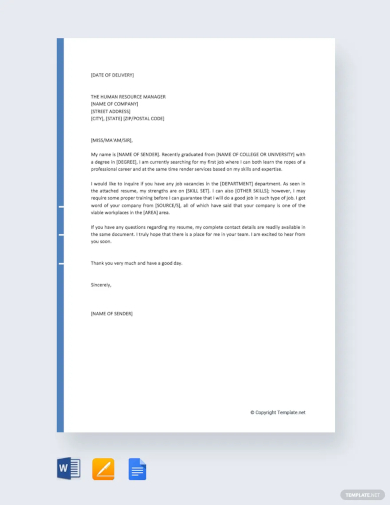
How to Write a Query Letter?
Writing a query letter involves presenting your book or project to a potential publisher or literary agent in a concise and engaging way. Here’s a step-by-step guide to writing an effective query letter:
1. Research the Recipient
- Know Your Audience: Research the publisher or agent to understand their preferences and submission guidelines.
- Personalize: Address the letter to a specific person (e.g., Mr. Alan Green, Senior Editor).
2. Include Your Contact Information
- Your Name
- Address
- Email Address
- Phone Number
- Date
3. Opening Salutation
- Greet the Recipient: Use a formal greeting like “Dear [Recipient’s Name],”.
4. Introduction
- Introduce Yourself and Your Work: Start with a brief introduction of yourself and your book.
- Hook: Include a compelling hook that grabs the reader’s attention.
5. Book Description
- Title and Genre: Mention the title and genre of your book.
- Word Count: State the word count of your manuscript.
- Brief Synopsis: Provide a concise and engaging summary of your book’s plot. Highlight the main conflict, protagonist, and stakes involved.
6. Author Bio
- Relevant Background: Share your writing credentials, relevant experience, and any previous publications or awards.
- Personal Touch: Mention anything personal that adds value to your credibility as an author.
7. Closing
- Request: Indicate that you are seeking representation or publication.
- Availability: Mention that you are willing to send the complete manuscript upon request.
- Thank You: Thank the recipient for their time and consideration.
- Signature: Sign off with a professional closing such as “Sincerely” or “Best regards” followed by your name.
8. Proofread
- Check for Errors: Ensure there are no spelling or grammatical errors.
- Polish the Language: Make sure the language is professional and polished.
Query Letter Sample to a Staff PDF
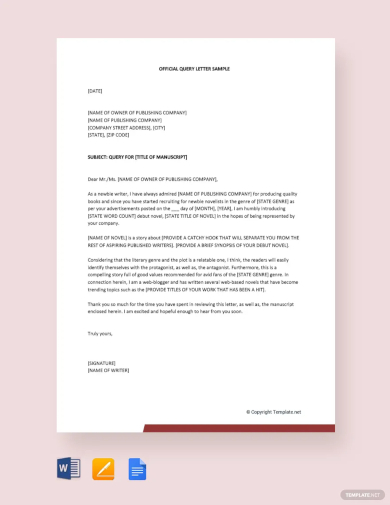
Query Letter Template
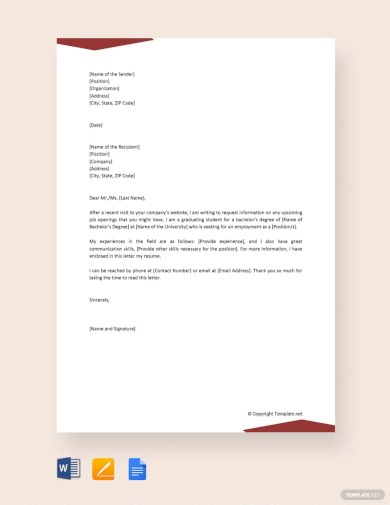
Official Query Letter Sample
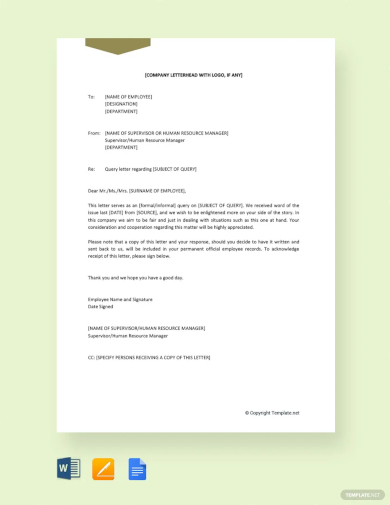
Tips For Writing a Query Letter
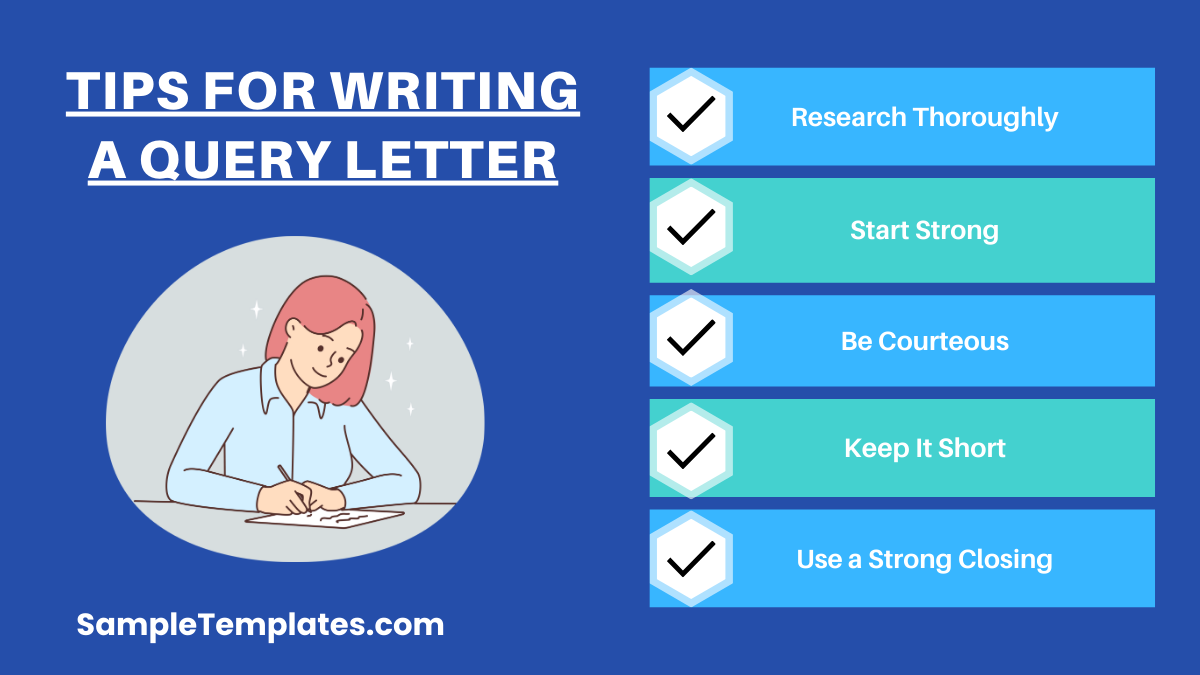
Writing a compelling query letter is crucial for catching the attention of literary agents and publishers. Here are some tips to help you craft an effective query letter:
1. Research Thoroughly
- Know Your Audience: Tailor your query to the specific agent or publisher. Mention why you chose them and how your work aligns with their interests.
- Follow Guidelines: Adhere to the submission guidelines provided by the agent or publisher.
2. Start Strong
- Hook: Begin with a strong opening sentence that grabs attention. This could be a unique aspect of your book or an intriguing question.
- Personalize: Mention any specific reasons you are querying this agent or publisher.
3. Clear and Concise Book Description
- Title and Genre: Clearly state the title, genre, and word count of your manuscript.
- Brief Synopsis: Provide a concise summary of your book’s plot. Highlight the main character, central conflict, and stakes.
- Avoid Spoilers: Tease the main plot points without giving away the entire story.
4. Showcase Your Voice
- Match the Tone: Reflect the tone and style of your book in your query letter. If your book is humorous, include a touch of humor; if it’s suspenseful, create a sense of intrigue.
5. Strong Author Bio
- Relevant Experience: Include any writing credentials, previous publications, or awards.
- Personal Connection: Briefly mention any personal experiences or background that contribute to your authority on the subject matter.
6. Professional and Polished
- Proofread: Ensure your letter is free of grammatical and spelling errors. A well-written letter reflects your writing skills.
- Format: Use a professional format with clear paragraphs. Keep it to one page.
7. Be Courteous
- Polite and Respectful: Thank the agent or publisher for their time and consideration. Maintain a respectful and professional tone throughout.
- Flexible: Indicate that you are willing to send the complete manuscript upon request.
8. Keep It Short
- Concise: Aim for a query letter that is concise and to the point. Typically, it should not exceed one page.
- Focused: Stick to the essential points—introduce yourself, pitch your book, and provide necessary background information.
9. Use a Strong Closing
- Express Interest: Reiterate your interest in working with the agent or publisher.
- Availability: Mention that you are ready to send the full manuscript or additional materials if requested.
10. Get Feedback
- Critique Groups: Share your query letter with writing groups or critique partners to get feedback and improve it.
- Revise: Be open to revising your query based on constructive feedback.
Query Letter Format PDF
What is a Query Letter to an Employee?
A sample query letter to an employee serves as a formal communication tool to address concerns, seek clarification, or initiate a discussion regarding specific aspects of their performance or conduct. The tone should be professional and objective, focusing on the facts and maintaining a constructive approach.
Begin the letter by expressing appreciation for the employee’s contributions and dedication. Clearly state the purpose of the query, whether it’s related to a specific incident, performance issue, or a general inquiry. Provide detailed information about the concern, referencing specific dates, incidents, or performance indicators.
Encourage the employee to share their perspective on the matter and provide an opportunity for open communication. Include any relevant policies, procedures, or expectations to support your points. Offer assistance or resources if the query involves performance improvement or specific tasks.
Conclude the formal letter by expressing the expectation for a timely response and the willingness to discuss the matter further. Ensure that the language used is respectful and professional, maintaining a balance between addressing the issue at hand and preserving a positive working relationship. A well-crafted query letter fosters transparency, allowing for a constructive dialogue between employer and employee.
Query Letter Examples
Reply to Query Letter
What are the Features of a Query Letter?
- Introduction:
- Begin with a professional salutation and a concise introduction, stating your name, background, and the purpose of the letter.
- Book Information:
- Clearly mention the title, genre, and word count of your manuscript. Provide a brief and compelling summary of your book to grab the agent or publisher’s attention.
- Author Bio:
- Include a brief and relevant author biography, highlighting your writing credentials, publications, and any pertinent experience that establishes your credibility as a writer.
- Personalization:
- Tailor each query letter to the specific literary agent or publisher you are addressing. Mention why you’ve chosen them and how your work aligns with their interests.
- Comp Titles:
- Include comparable titles (comp titles) to give the agent or publisher a sense of where your work fits in the market. This helps them understand the potential audience for your book.
- Unique Selling Point (USP):
- Clearly articulate what makes your book unique and marketable. Identify the elements that set your work apart from others in the same genre.
- Manuscript Status:
- Indicate the status of your manuscript, whether it’s complete or still in progress. Agents and publishers want to know if you have a finished, polished product ready for review.
- Closing:
- Express your gratitude for the agent or publisher’s time and consideration. Include any additional materials they may require, such as sample chapters or a full manuscript.
- Contact Information:
- Provide your contact details, including email and phone number, making it easy for the recipient to reach out to you. Ensure your email address is professional.
- Politeness and Professionalism:
- Maintain a respectful and professional tone throughout the simple letter. Avoid overly casual language and focus on presenting yourself and your work in a positive light.
- Follow Submission Guidelines:
- Adhere to any specific submission guidelines provided by the literary agent or publisher. This may include preferred formatting, document length, or additional materials they want to receive.
- Proofreading:
- Thoroughly proofread your query letter to eliminate grammatical errors and ensure clarity. A well-polished letter reflects your attention to detail and professionalism.
Response to Query Sample
Types of Query Letters
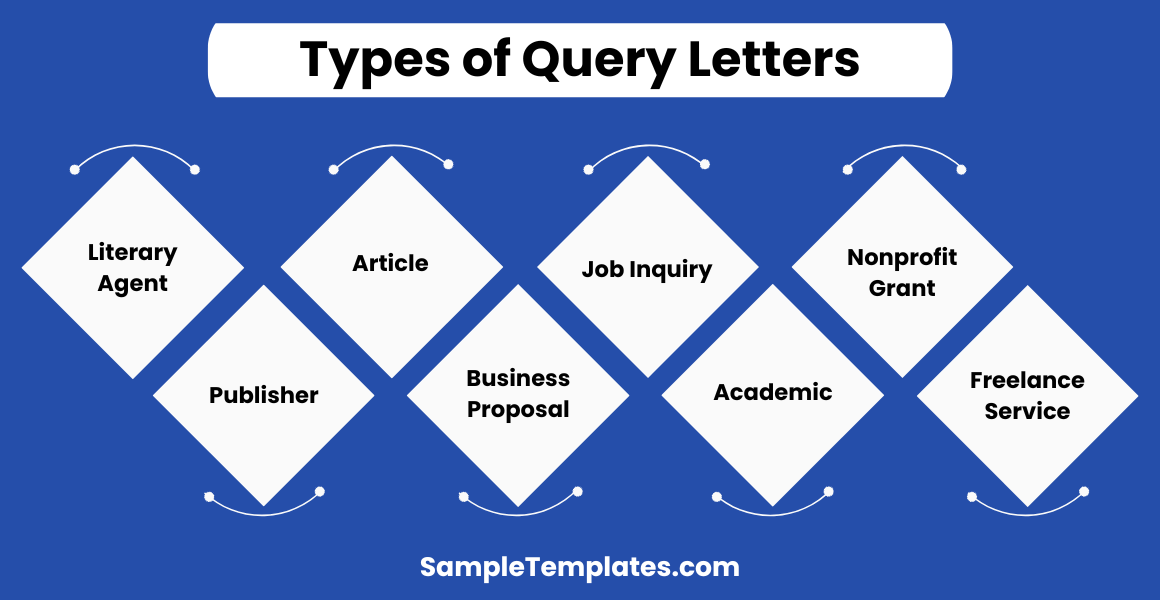
Here are eight important types of query letters, each tailored for different purposes and audiences:
1. Literary Agent Query Letter
- Purpose: To pitch a manuscript to a literary agent.
- Content: Includes a brief synopsis of the book, word count, genre, and a short author bio.
2. Publisher Query Letter
- Purpose: To propose a book directly to a publisher.
- Content: Similar to an agent query letter but may also include market analysis and a brief description of the target audience.
3. Article Query Letter
- Purpose: To propose an article to a magazine, newspaper, or online publication.
- Content: Includes a summary of the article idea, why it’s a good fit for the publication, and the writer’s credentials.
4. Business Proposal Query Letter
- Purpose: To propose a business idea, partnership, or service.
- Content: Outlines the proposal, its benefits, and why it would be advantageous for the recipient.
5. Job Inquiry Letter
- Purpose: To inquire about potential job openings within a company.
- Content: Includes a brief introduction, why the applicant is interested in the company, and a summary of relevant skills and experiences.
6. Academic Query Letter
- Purpose: To propose a research idea or seek collaboration with a professor or academic institution.
- Content: Details the research proposal, its significance, and the writer’s academic background.
7. Freelance Services Query Letter
- Purpose: To offer freelance services to potential clients.
- Content: Highlights the services offered, examples of past work, and why the client would benefit from these services.
8. Nonprofit Grant Query Letter
- Purpose: To request funding or support for a nonprofit project.
- Content: Includes a description of the project, its goals, the impact it will have, and why the funder should consider supporting it.
Each type of query letter is tailored to its specific purpose and audience, ensuring that the content is relevant and persuasive to the recipient.
Query of Letter
How to Format a Query Letter
As much as you want to make a lasting impression, steer clear from fancy fonts, colors, scented papers, and what have you. A query letter has to follow the business formatting guidelines, be addressed accordingly, and should therefore be in black text of a professional font family, sized 12, and preferably printed on a letter-sized bond sample paper. Use these Sample Query Letters to guide you with the format.
More importantly, a query letter has to be concise. At most, it should only have 300 words in it.
What to Write in a Query Letter
With that word count in mind, it is thus very important to make the most convincing and compelling query letter. It should contain the following elements:
- the genre of your work,
- its title,
- the number of words,
- your previous works, and
- your recognition from major award-giving bodies, if any.
Many writers start their letters by identifying their referrals or relations to the addressed agent or publisher. If you have neither, a neat way to make an introduction is a story hook.
What a Story Hook Is
A story hook should incite interest in the plot chart of your piece, in the same way that the descriptions on the back of books captivate the interest of readers. This time, though, you have to do so with far lesser words. Your story hook should capture what your story is all about, by introducing the lead and his or her conflict, as well as the setting the story is in.
Query Letter Example
Query Reply Letter Format
Sample Query Letter in MS Word
FAQ’s
A Query Letter vs. an Inquiry Letter
Whereas query letters are addressed to publishing houses and agents, inquiry letters are business documents sent to companies by job seekers. These are typically written when an applicant wants to learn about job vacancies in a company that would suit his or her skills and qualifications. To know more, see these Sample Inquiry letters.
What a Query Letter Is
As a writer, your query letter should introduce your article, story, or novel to potential publishers. Remember, it is your marketing tool or sales pitch. How attractive your literary product is to them is all up to your query letter writing it as though you are asking for their representation of yourself as the author and of your work. No publishing house or literary agent still goes through an entire manuscript without a query letter. The query letter decides whether what you’re selling is worth their time and their consideration.
Is Query Letter a Formal Letter?
Yes, a query letter is a formal communication. It is a concise and structured letter typically used in professional settings to make inquiries, request information, or propose ideas.
How Long is a Query Letter?
A query letter outline is typically one page long, succinctly introducing a writer’s project to literary agents or publishers. It includes a brief synopsis, author bio, and contact information.
Do Query Letters Work?
Yes, query letters can be effective in securing opportunities. A well-crafted query introduces your proposal, showcases your credentials, and generates interest, increasing the likelihood of a positive response from recipients.
What is the Conclusion of a Query Letter?
The conclusion of a query letter format should express gratitude, restate the main points, and convey enthusiasm. It should invite further discussion and express readiness to provide additional information if needed.
In conclusion, a well-crafted query letter is your first step towards capturing a publisher’s interest. It should succinctly convey the essence of your work, highlight your credentials, and demonstrate your manuscript’s fit for the recipient’s list. A compelling query can open the door to a successful publishing partnership.
Related Posts
Visa Invitation Letter
Passport Authorization Letter
11 FREE Nomination Letter Samples & Templates
10 FREE Debt Verification Letter Samples & Templates
Advertising Proposal Letter
Service Letter
Distributor Letter of Appointment
Product Proposal Letter
Reservation Letter
Quotation Letter
Assignment Letter
Exemption Letter
To Whom It May Concern Letter
10 FREE Notice To Quit Letter Samples & Templates
Marriage Proposal Letter
